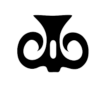Additional Adinkra Symbols
Abusua Pa

Good family. A symbol of family unity, kinship ties, and family support. From the expression, "Abusua pa mu na adoye ne koroye wo," to wit, "It is in a good family that we have love and unity."
Anyi Me Aye A

If you will not praise me. A symbol of ingratitude, ungratefulness, and boorishness. From the expression, "Anyi me aye a, nsee me din," to wit, "If you will not praise me, don't spoil my name (that is, undermine my integrity)."
Asaawa

Sweet berry or miracle berry. A symbol of sweetness, sweet taste, pleasure, and hedonism. From the proverb, "Asaawa se: Ode nka anomu," to wit, "Sweetness does not stay in the mouth forever."
Asetena Pa

Good living. A symbol of conspicuous spending, indulgence, wealth, and upper social class. From the saying "Asetena pa ye awerefire," to wit, "Good living is forgetfulness (that is, good living makes one forget his humble beginnings)"
Boa Me Na Me Mmoa Wo

Help me and let me help you. A symbol of cooperation and interdependence. From the aphorism, "Boa me na me mmoa wo," to wit "Help me and let me help you" or, "Benkum dware nifa na nifa nso adware benkum," to wit, "The left (hand) washes the right and the right washes the left."
Dwantire

Ram's head. A symbol of innocence and guiltlessness. From the proverb, "Dwantire se: Me tiri mu faa; okwasea bobonya menni fo nti na mabo hyire," to wit, "The head of the ram says: My conscience is free; the righteous fool who never tastes of guilt should not be dressed in black, hence, I am always in white." The idea here is that the guiltless fears no accusation.
Esono Anantam

Elephant's footprint. A symbol of leadership, protection, power, and security. From the aphorism, "Wodi esono akyi a, hasuo nka wo," to wit, "When you follow the elephant, you don't you are not touched by (you don't get wet from) the dew on bushes."
Fawohodie

Freedom or independence. A symbol of freedom, independence, emancipation, self-determination, and self-government. From the proverb, "Fawohodie ne obre na enam," literally, "Freedom walks with suffering," that is, "Freedom or independence comes with responsibilities."
Kete Pa

Good bed. A symbol of good marraige, successful marriage, and good care. From the expression, "Obaa ko aware pa a na yede no to kete pa so," to wit, "It is when a woman enters a good marriage that she is put on a good bed."
Kokuromotie

Thumb. A symbol of cooperation, participation, teamwork, indispensability, and harmony. From the proverb, "Yensiane kokuromotie ho mmo po," to wit, "We don't bypass the thumb to tie a knot." Anybody who tries the exercise of tying a knot without his thumbs quickly appreciates this proverb.
Krapa (Musuyidee)

Krapa means "good soul" while Musuyidea means "a thing for removing filth or evil." It is a symbol of spiritual balance, good fortune, good luck, sanctity, spiritual strength, and teh uprightness of spirit
Kyemfere

Potsherd. A symbol of knowledge, experience, service, keepsake, antiquity, rarity, and heirloom. From the proverb, "Kyemfere se odaa ho akye, na onipa a onwenee no nso nye den?" to wit, "The potsherd claims it is old; what about the potter who molded it?"
Mate Masie

I have heard and kept it. A symbol of wisdom, knowledge, and prudence. From the saying, "Nyansa bon mu ne mate masie," to wit, "The hole of wisdom is 'I have heard and kept it'"
Mekyea Wo

I greet you. A symbol of greetings, recognition, and respect. When two Akans meet, they first greet each other before proceeding to do anything else. They greet not just to exchange pleasantries but because to greet is to recognize a fellow human being.
Nea Ope Se Obedi Hene

He who wants to be a king. A symbol of the qualities of a leader, service, and leadership skills. From the expression, "Nea ope se obedi hene daakye no firi asee sua som ansa," to wit, "He who wants to be a king in the future begins by learning how to serve."
Nkotimsefo Mpua

The hairstyle of court attendants. A symbol of loyalty and a readiness to serve
Nkrabea

Destiny. A symbol of destiny, determinism, unequal distribution of talents, and inequality. From the aphorism, "Esono onipa biara ne ne nkrabea," or, "Onyame nkrabea mu nni kwatibea" which translate literally to "Everybody has their own distinct destiny" and "God's destiny cannot be circumvented" respectively
Nkyemu (Nkyimu)

The crossed divisions made on Adinkra cloth before the stamping of the symbols is done. A symbol of adroitness, precision, and quality craftsmanship.
Nserewa

Cowries. A symbol of affluence and wealth. Also a symbol of sacredness when used by priests. Cowries were traditionally used as money in parts of West Africa before the colonial era. In fact, the anglicized form of the Twi word for 'cowry'--'sedee'--is what was adopted as the name for the national currency when the nation weaned itself off of the Ghanaian pound after independence.
Nyame Baatanpa (Awurade Baatanfo)

God the good parent. A symbol of the caring and nurturing of God over all his creation.
Nyame Nti

By God's grace. More literally, "Because of God." A symbol of faith and trust in God. The proverb associated with this symbol is, "Nyame nti, menwe wura," to wit, "Because of God (by God's grace), I won't feed on leaves (like an animal)."
Nyansapo

Wisdom knot. A symbol of wisdom, ingenuity, intelligence, and patience. The proverb associated with this Adinkra is "Nyansapo wosane no badwenma," to wit, "A wisdom knot is untied (only) by the wise." The Kwame Nkrumah University of Science and Technology (KNUST) uses Nyansapo in their logo and uses the associated proverb as their motto.
Obohemaa

Diamond. Obohemaa literally means "queen of stones" and in this case represents a diamond. It is a symbol of preciousness, gem, and treasure. From the maxim, "Wo de wo sika to aboo a, wowe," to wit, "If you use your money to buy (non-precious) stones, you eat them."
Ohene Aniwa

The king's eyes. A symbol of vigilance, far-sightedness, intelligence, protection, security, defence, authority, and power. From the aphorism, "Ohene aniwa twa ne ho hyia," to wit, "The kings eyes surround him," that is, "The king sees everything."
Okodee Mmowere

The talons of an eagle. A symbol of strength, bravery, and power. These attributes are derived from the character and traits of the eagle.
Owo Foro Adobe

A snake climbs a raffia palm. A symbol of ingenuity, excellence, feat performance, and performing the unusual or impossible
Pempamsie

Sew in readiness. A symbol of foresight, readiness, steadfastness, hardiness, valor, and fearlessness.
Sunsum (Ntoro)

Soul. A symbol of spiritual purity and cleanliness of the soul. The Akans believe that this is the part of God the creator that is transmitted to a person through his father. A person's mother cannot transmit sunsum to him. Instead, she transfers her mogya (blood) to him
Tabono

Paddle or oar. A symbol of strength, confidence, and persistence. These attributes are derived from the qualities required of one who paddles a boat.
Wo Nsa Da Mu A

When your hands are inside (the dish). A symbol of participatory government, democracy, and pluralism. From the aphorism, "Wo nsa da mu a, wonni nnya wo," to wit, "When your hands are inside the dish, people don't eat everything and leave you nothing."